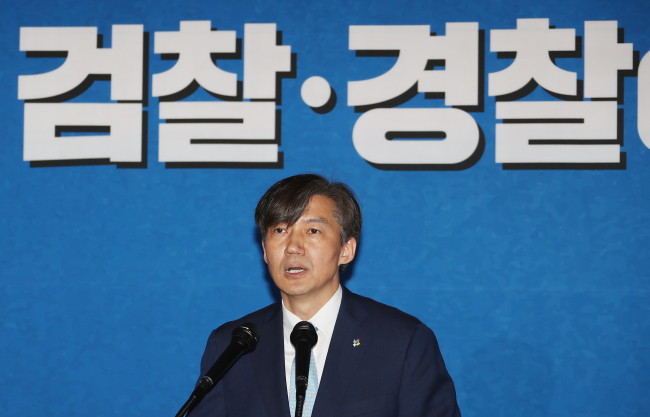Police will be authorized to close cases, and freed from prosecution’s command in conducting investigations, according to the government’s plans for restructuring criminal investigations Thursday.
The plans were outlined in an agreement reached by the prosecution and the police agency. The agreement was submitted to the National Assembly’s special committee for judicial reform for review.
The plans also include a number of measures to prevent either body from abusing its powers and ensure the transparency of investigations. An independent body investigating cases involving high-level government officials is to be set up.
 |
Cho Kuk, senior presidential secretary for civil affairs (Yonhap) |
At present, a police investigation is directed by the prosecutors’ office once a case develops beyond the preliminary investigation stage.
Although the plans would give police the rights to end an investigation without transferring it to the prosecution, the police will be required to transfer a case if demanded by parties involved in the case.
The plans will also see a national body for overseeing police investigations established under the National Police Agency, relieving top officers of the agency of the authority to directly guide investigations
As for the prosecution, it will retain sole rights to seek prosecution and to apply for warrants, but much of its investigative powers will be reduced.
Under the plans, the prosecution will be the primary investigator only in corruption cases involving police officers and prosecutors assigned to the high-level civil servants investigation body. Economic, financial and election related cases and crimes involving civil servants will also be within the purview of the prosecution.
The prosecution will also have priority if a case comes under investigation by the police and prosecutors’ office simultaneously.
In addition, the prosecution will have the authority to conduct its own investigations once a case has been transferred from the police, and to request further investigations by the police. The prosecution will also be able to request police officers to be penalized if a request for a reinvestigation is rejected without clear cause.
An independent committee for reviewing warrant requests will be established under high prosecutors’ offices. The committee will comprise individuals selected from outside the prosecution, the plans showed. Police will reserve the right to object if a warrant request is not processed without due cause.
The government also revealed plans to establish regional police agencies as part of measures to prevent the police agency from becoming too big, and being given too much authority.
Under the plans, regional police agencies will begin operations in Seoul, Sejong and Jeju by 2019. The system will be expanded nationwide within President Moon Jae-in’s term, which ends in 2022.
While there are concerns that regional agencies could weaken the National Police Agency’s role in keeping public order, the presidential office played down such issues, saying that problems will be address before the system is applied nationwide.
“Problems will be addressed through pilot operations (in Seoul, Sejong and Jeju), and (the system) will be applied nationwide in one step,” Cho Kuk, senior presidential secretary for civil affairs, said.
He added that regional police agencies’ investigative authority will come under central control, rejecting concerns that corruption within regional societies could hamper their operations.
The police agency has also been tasked with drawing up measures to prevent officers in non- investigative posts from interfering with investigations and to strengthen mechanisms for protecting human rights.
By Choi He-suk (
cheesuk@heraldcorp.com)




![[Today’s K-pop] Blackpink’s Jennie, Lisa invited to Coachella as solo acts](http://res.heraldm.com/phpwas/restmb_idxmake.php?idx=644&simg=/content/image/2024/11/21/20241121050099_0.jpg)



